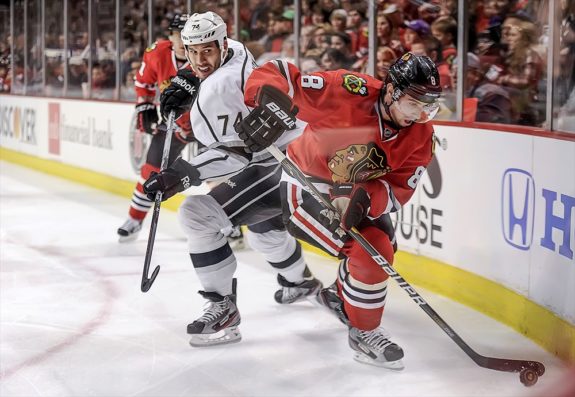The Minnesota Wild had high expectations for defenseman Nick Leddy when they selected him 16th overall at the 2009 NHL Entry Draft. There was plenty to love about the promising blueliner, whether it was his offensive skills that saw him record 83 points in 80 high school games before being drafted or the fact that he was a local boy, having been born and raised in Eden Prairie, Minnesota.
Leddy’s time with the Wild didn’t last long, though. Less than a year after getting drafted, the organization traded the then-19-year-old’s rights and defenseman Kim Johnsson to the Chicago Blackhawks in exchange for former 2004 third-overall pick Cam Barker. There was a lot of hype surrounding Barker at the time, but it still came as a shock that the Wild were willing to move away from Leddy as soon as they did.
It’s not a trade that is talked about too much due to there not being any superstar players involved in the deal. Still, it’s worth revisiting for the sheer fact that it may have set the Wild back a couple of years at the time.
What Did the Wild Lose?
Nick Leddy, D
The biggest part of the trade that the Wild lost was, obviously, Leddy. As mentioned before, he was seen as someone who had some promising offensive upside. The NHL in 2009 wasn’t like it is today, where most teams have multiple offensive defensemen to rely on. In fact, Marek Zidlicky led all Wild blueliners with 42 points at the end of the 2008-09 season.
It didn’t take long for Leddy to make much of an impact with the Blackhawks. After finishing with only seven points in 46 games as a rookie during the 2010-11 NHL season, he ended his sophomore campaign with three goals and 34 assists in 82 contests. Duncan Keith was the only Chicago defenseman to finish with more points (40) than him that season despite the latter only being 20 years old. At the end of the day, Leddy had a total of 93 points in 258 games over four seasons with the Blackhawks before they traded him to the New York Islanders in exchange for three players in October 2014.

Leddy went on to play a total of seven NHL seasons with the Islanders, playing at a 0.47 point-per-game (P/G) pace. He brought some excitement to the club’s back end, tallying three 40-plus-point seasons and even finishing 16th in Norris Trophy voting during the 2014-15 season. It didn’t take long for the league to view him as a top-four defenseman that could create offense while chipping in with the occasional defensive play.
Related: 3 Minnesota Wild Targets for Pick No. 26 of the 2022 NHL Draft
As it stands, Leddy has racked up 360 points over 851 games over his career. Even though he’s never been the best player at his position, that point total would rank him third all-time when it comes to Wild defensemen scoring, trailing only Ryan Suter at 369. Would Leddy have become the same defenseman had he stayed in Minnesota? Maybe not with the defense-first mentality that a lot of the club’s earlier rosters had. Nevertheless, trading him away as early as the Wild did was a huge mistake because there’s a good chance that he would’ve helped them become a contender much sooner.
Kim Johnsson, D
Along with Leddy, the Wild also sent Johnsson packing to the Blackhawks. That part of the trade hurts a lot less because the veteran Swedish defender only played eight games with his new team before a concussion sidelined him for the remainder of the regular season and playoffs, effectively ending his professional hockey career.
What Did the Wild Gain?
Cam Barker, D
Leading up to the 2004 NHL Entry Draft, Barker looked like he was poised to take the league by storm, so it’s no surprise that the Wild were ready to pounce on him when he became available. The former Medicine Hat Tigers defenseman had 112 points in 133 games over the final two Western Hockey League (WHL) seasons leading up to his draft year, where the Blackhawks took him third overall.

After winning back-to-back IIHF World Junior gold medals with Canada in 2005 and 2006, Barker transitioned to the professional level full-time in 2006-07. After some growing pains, he looked like he was hitting his stride during the 2008-09 campaign, finishing with six goals and 34 assists in 68 games, putting him on pace for 48 points in an 82-game campaign.
Unfortunately, any promise surrounding Barker vanished the following season, which happens to be when the Wild acquired him. The then-23-year-old only had 14 points in 51 games before he was shipped off to Minnesota before closing out the year with a goal and six assists in 19 games.
Some thought he’d need some extra time to adjust to his new surroundings, but that wasn’t the case. A total of five points in 54 games during the 2010-11 campaign was all the Wild needed to decide to waive Barker in the offseason.
Barker experienced short stints with the Edmonton Oilers and Vancouver Canucks before continuing his playing career in Europe, where he retired in 2021. Not only did he fail to live up to the expectations that come with being a third-overall pick, but the Wild’s acquisition of him is still something the fanbase regrets to this day.
The Wild Lost the Leddy-Barker Trade
Whether or not you exclude Johnsson because of his career-ending concussion, the result is the same: the Wild lost this trade. Understandably, Barker had some allure due to his draft status and 2008-09 performance, but the fact that he was already slowing down during the following season should’ve set off red flags for Minnesota. There was a reason why the Blackhawks had no issue parting with the former third-overall pick, and the Wild learned why the hard way.
Related: 3 Minnesota Wild Offseason Moves That Must Be Made
Leddy could’ve been a part of the Wild’s defensive core for most of the 2010s, forming what could’ve been one of the top units alongside the likes of Suter, Jared Spurgeon, Jonas Brodin and Mathew Dumba. Obviously, the past can’t be changed, but sometimes it can be fun just wondering how things could’ve been different if Leddy stayed with the Wild a bit longer.
